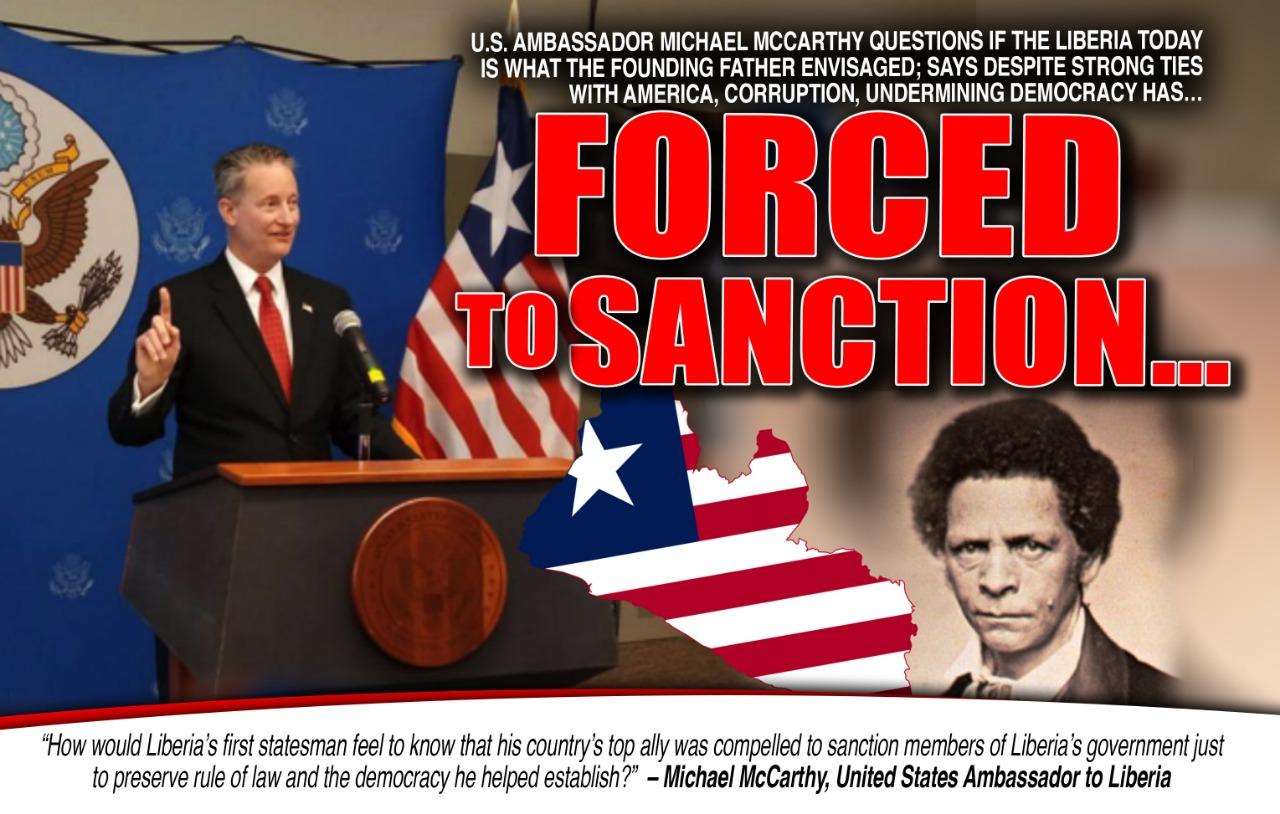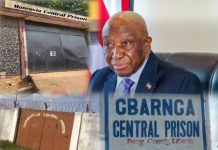
Africa-Press – Liberia. From the onset of his nomination as the United States Ambassador to Liberia by ex-president Donald J. Trump, Ambassador Michael McCarthy had it firm in his mind that a greater part of his mission in Liberia would be to stem out corruption, work towards improving human rights and rule of law and that’s what he told Congress on Thursday, August 6, 2020 when he appeared for confirmation hearing.
“Liberia cannot and should not backtrack from the progress it has made to increase transparency and fight corruption, integral to establishing the conditions necessary for foreign investment. Liberia’s growth and development will depend on increased trade and investment, which in turn will require that U.S. and international businesses are confident they can compete openly and fairly and that any concerns will find remedy in an honest and impartial justice system,” he said in his address to the Senators.
He went on to say as a Representative of the U.S. Government in Liberia and ensuring that an amicable environment exists in Liberia where U.S. businesses can freely run their business is integral to ensuring that human rights and struggles to deal with reported cases of gender-based violence, rape, child labor, human trafficking, good governance, accountability, and rule of law are addressed.
And true to his address to his country’s congress, Liberia has witnessed the sanctioning of two prominent figures by the U.S. since Amb. McCarthy’s ascendency. In May 2020, the Embassy strongly opposed the Senate’s election of former warlord Prince Y. Johnson as Chairman on Security and Intelligence Committee. The Embassy went on to state that it would not work with Sen. Johnson as long as he remained in the post. This led to his resignation a chairman of the committee.
Later the same year, the U.S. Treasury Department slammed Senator H. Varney G. Sherman with sanction for bribery his way through the judicial system to get a not guilty verdict in the Sable Mining case unearthed by Global Witness. He was accused by the Global Witness of being at the center of a major bribery saga in the mining industry.
He was also said to be have paid judges on behalf of his clients to render a preferred judgement. The subsequent year, Senator Prince Johnson was also included on the sanction list.
He was accused to have been involved in pay-for-play funding with government ministries and organizations for personal enrichment. As part of the scheme, upon receiving funding from the Government of Liberia (GOL), the involved government ministries and organizations launder a portion of the funding for return to the involved participants. The pay-for-play funding scheme involves millions of U.S. dollars. Johnson has also offered the sale of votes in multiple Liberian elections in exchange for money.
Both sanctions were in observance of the International Anti-Corruption Day. Last year in November, Ambassador McCarthy called on the Liberian government to boost up its efforts to strengthen areas of governance, especially the fight against corruption, as identified in the Millennium Challenge Corporation (MCC) scorecard.
The Liberian Government’s hope of securing a second compact from the MCC has been dealt huge blow after the country, for the fourth year in a row, failed its Scorecard. Like last year, the country only passed nine of the twenty indicators, as released by the MCC in its Fiscal Year 2022 report
The eleven indicators that Liberia failed include the Rule of Law, fiscal policy, primary education expenditure, natural resource protection, inflation, trade Policy, government effectiveness, regulatory quality, immunization rates, girls’ primary education completion rate and child health.
While the nine indicators it passed include political rights, civil liberties, freedom of information, gender in the economy, land rights and ccess, Health expenditures, Access to Credit, Business Start-Up and Control of Corruption.
Drawing J.J. Roberts into the Fray
Apparently frustrated over the state of governance in the country and lack of political will to fight corruption, Amb. McCarthy wondered if Liberia today is what the founding father, Joseph Jenkins Roberts envisaged.
In a damning Op-Ed released on March 15 as the country observes the birthday of the first president as a national holiday, Amb. McCarthy asked “What Joseph Jenkins Roberts would say about Liberia today?”
He lamented that despite America’s enormous foreign service assistance to Liberia, the country continues to remain stagnant while corruption remains high at the detriment of poor Liberian citizens and the American taxpayers.
He stated, “Sixty years after the arrival of the United States Agency for International Development (USAID) in Liberia, 19 years after the end of the civil war crisis, and seven years after the eradication of Ebola, the taxpayers of the United States contribute to this country over $110 million per year of foreign assistance. This includes over $79 million per year donated to the health sector.
“Approximately $9 million is specifically for purchasing medications and commodities for the Liberian people and improving the Ministry of Health’s effective distribution and warehousing of pharmaceuticals. Despite this extra support, we learn regularly about places like Kolahun in Lofa County and Sanniquellie in Nimba County, where clinics and hospitals must make do without even the most basic drugs.
“Troublingly, Embassy investigations indicate that not only are some citizens diverting public medical resources and low-cost drugs for personal gain, but that babies, young children, and birthing mothers are dying needlessly as a result.”
Ambassador McCarthy expressed the absurdity of the Monrovia City Corporation lamenting that waste collection in the country’s capital has been left as the sole responsibility of the Monrovia City Government – no donor support. In Ambassador McCarthy’s view, it is indeed supposed to be the full responsibility of the residents of Monrovia and the City Government to ensure a clean capital city.
He stated that he has seen in an African villages poorer than Monrovia and without electricity coordinating with government to dispose garbage at designated landfill. He stated, “The state of cleanliness in the city of Monrovia, which is more developed and a far wealthier community, sadly does not compare.
“Last month, I was surprised at the words of city leadership on Monrovia Day. A senior official lamented that unlike his previous three years in office, “no donor or external partner is funding the recurrent cost of solid waste collection and disposal,” implying that he was abandoned by the international community. Is there a more basic local government responsibility than the collection and proper disposal of garbage?
“Would Liberia’s first president have imagined that, 175 years after independence, foreigners should be held responsible for the removal of garbage in his capital city?”
Amb. McCarthy went on to recall the failure of the Legislature to make use of the electric voting system purchased by American taxpayers for the Liberian Legislature to help improve transparency in the way voting is done at the Capitol.
While the Liberian government may have swept this issue under the carpet, it remains fresh on the mind of the Americans who see the failure on the part of the legislature to use the equipment as an affront to democracy.
He stated, “On February 25, we learned that a Rhode Island State Representative, Nathan W. Biah, Sr., is donating electronic voting equipment to the Liberian House.
“This is not the first of such equipment donated to help make Liberia’s top legislative body more transparent to its citizens. I have been reliably informed that a previous e-voting system was installed in 2014 by the U.S. taxpayer-funded National Democratic Institute (NDI), but it was never used.”
He went on to ask rhetorically, “Would J.J. Roberts have believed that in modern Liberia, a constitutional republic where “all power is inherent in its people,” legislators would purposely neglect to use a tool created to educate citizens on how their democratically elected representatives vote?”
He further wondered what J. J. Roberts would have say about Liberia which is supposed to have the strongest ties with America on the continent citizens being sanctioned by America for corruption and undermining democracy.
He referenced the U.S. House of Representatives Resolution 907 on February 4 of this year, which encourages Liberia to redouble its efforts to counter corruption and advance the causes of human rights, implementation of critical economic reforms necessary to accelerate sustainable economic growth and human capital development and calls on the U.S. Treasury and State Departments to continue to impose targeted sanctions against those responsible for undermining the rule of law and trust of the Liberian people through corruption, gross violations of human rights, and other acts that threaten the peace and security of Liberia.
Amb. McCarthy also recalled the statement of the Special Assistant to the President of the United States Dana Banks who indicated during her speech at the Bicentennial celebration that, “corruption eats away at the democracy you have worked so hard to build. But ultimately, only the Liberian Government and the Liberian people can tackle corruption, fight for accountability and transparency, and move this country forward.”
Ironically, the U.S. Ambassador’s Op-Ed comes at a time when President George Weah has urged Liberians to aspire to higher and noble endeavors by emulating his courage, endurance, selflessness and commitment to the principles and ideals of democracy as portrayed in his works and life as Liberia’s first President.
For More News And Analysis About Liberia Follow Africa-Press





